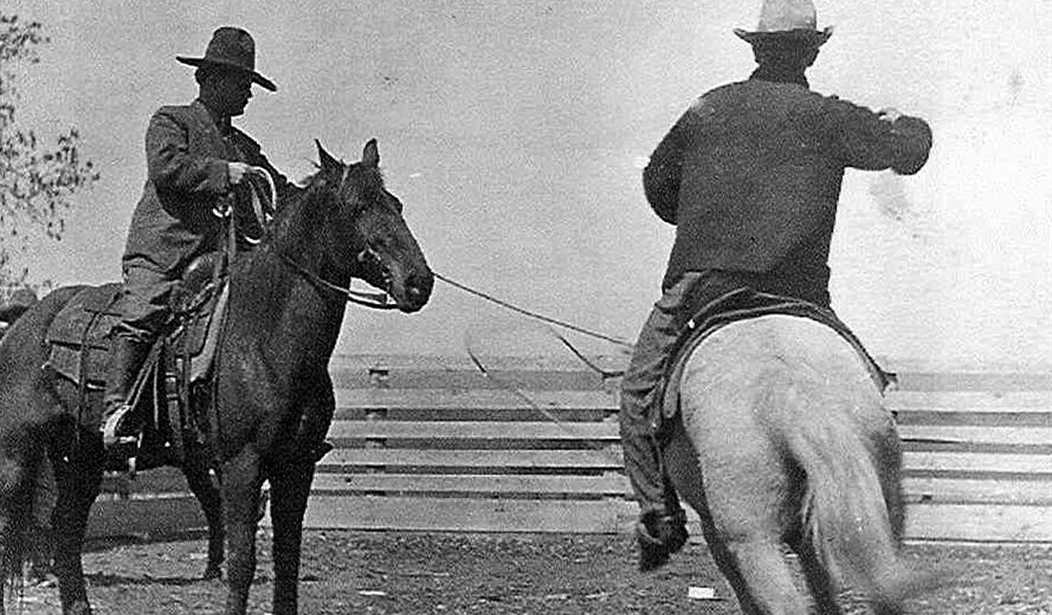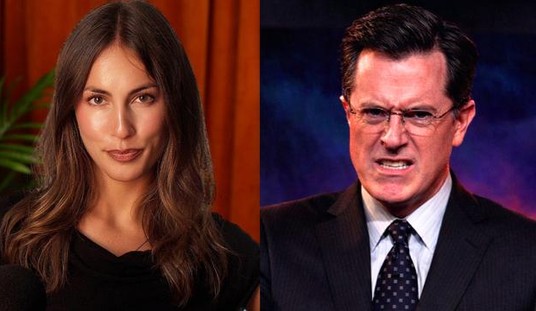Fill Your Hands, You Son of a B***h
There’s a moment in True Grit that captures the soul of the American myth. Rooster Cogburn, single eye squinting, reins clenched in his teeth to free both hands for revolvers, charges a line of killers after bellowing, “Fill your hands, you son of a b***h!” It’s raw, unpolished, unashamed. There’s no quip, no irony, no apology. Just a man doing what must be done.
That’s the Western hero in miniature: quiet, unassuming, often reluctant to fight, but when duty calls, unquestionably courageous. He’s not cruel, though he can be hard. He’s not perfect, though he has a code. He knows the wilderness is dangerous, but civilization must be protected, and he’s the hinge between the two.
Even Gene Wilder, in 1974's Blazing Saddles, understood the power of that archetype. His “Waco Kid,” drunk, broken, haunted, is a parody built on love, a man who mocks what he once was because the world no longer believes in it. Beneath the farce, that film mourns what’s been lost. We laugh because we recognize the truth.
Once upon a time, America was built on Westerns. You couldn’t walk into a dime store or library without finding rows of them. Paperbacks stacked like ammo belts, names like Zane Grey, Louis L’Amour, and Max Brand. On television, Gunsmoke, Bonanza, Rawhide, and Have Gun – Will Travel ruled the airwaves. Before that, radio dramas like The Lone Ranger and Zorro carried tales of justice and redemption across the heartland.
The Western was our mythology, the first and perhaps only genre born wholly on American soil. It didn’t borrow Arthurian castles or Norse gods. Its temples were canyons. Its saints wore dusters. Its sinners sought forgiveness on horseback. And for nearly a century, it gave Americans a common language of courage, restraint, and redemption.
But something happened right around 1970.
The Great Purge of the Prairie
What happened wasn’t just a shift in taste. It was a cultural coup. Historians call it the Rural Purge, and it marked one of the most deliberate acts of cultural cleansing in American media.
Network executives, chasing “modern” urban demographics, wiped out everything that smacked of rural America. CBS alone axed more than a dozen top-rated shows — The Beverly Hillbillies, Green Acres, Hee Haw, Petticoat Junction, Mayberry R.F.D. — and with them, nearly every Western still on air. Bonanza and Gunsmoke limped on for a time, but the direction was clear. By the mid-’70s, the West was dead on network television.
The justification was demographics and money. The true motive was politics. Advertisers wanted younger, urban, “sophisticated” consumers, the ones buying luxury cars instead of tractors. But underneath that corporate language was something deeper: a desire to distance mass culture from old-fashioned virtue, patriotism, and faith. The Western, with its insistence on duty and decency, suddenly looked like a relic of the people the elites wanted to forget.
The Rural Purge wasn’t just about geography. It was about dueling values.
When the smoke cleared, television no longer showed a man wrestling with conscience under an open sky. It showed neurotics in apartments. The frontier hero was replaced by the ironic antihero, the cosmic joke, the cynical intellectual who smirked at the very idea of duty or sacrifice. America’s hero was no longer the tough, independent man living on the edges of the law and the frontier; he had been domesticated. The only tough, independent men left were barely-legal gumshoes or outright outlaws.
A few lights remained, at least in the movies where consumers, not advertisers, dictated content. Clint Eastwood’s spaghetti Westerns — The Good, the Bad and the Ugly, High Plains Drifter, The Outlaw Josey Wales — carried the old soul even with foreign dust. Eastwood’s gunslinger was weary but not nihilistic. He still believed in justice, paid in blood.
But too often, the Western that followed turned inward, fixating on guilt and grievance, recasting the cowboy as villain and the homesteader as oppressor. The American project itself became a moral crime. What had been our purest expression of moral imagination—the belief that courage and faith could civilize the wilderness—was dismantled and sold back as irony.
The myth of the West wasn’t destroyed by obsolescence. It was destroyed by shame.
The Fall of Country Music and the Silencing of the Story
If the Western was America’s moral imagination on film, country music was the same spirit set to a guitar.
Its heart was never twang and fiddle. It was storytelling. Before there were music videos, there was the Grand Ole Opry. Born on radio in 1925, it carried the sound of the South, the hills, and the plains into every home. A family could sit by the Philco on Saturday night and hear Roy Acuff, Mother Maybelle Carter, and Uncle Dave Macon telling the nation’s story in song.
When television arrived, the Opry gave faces to the voices. The Western and the Opry grew side by side, one in moving pictures, the other in melody, each a sermon about honor, home, and redemption.
By the 1950s and ’60s, country music had become America’s moral soundtrack. Hank Williams wrote psalms for the broken. Johnny Cash sang prison hymns to the damned. Patsy Cline, Loretta Lynn, Merle Haggard, and George Jones all told stories that bore moral weight.
Then came the Nashville Sound: smooth, polished, and aimed at crossover audiences. It wasn’t evil, just domesticated. But the same forces that killed the Western were at work again. Executives wanted suburban, not small-town. Glamour, not grit. The Opry became a stage show for tourists, and the soul began to drift.
The Outlaw movement of the 1970s — Waylon, Willie, Kristofferson, and Cash — tried to reclaim authenticity, but the tide kept turning. By the 2000s, bro-country had arrived with beer, trucks, and tailgates. The men were overgrown boys, the women background dancers, and the stories gone. The moral backbone had been replaced by rhythm tracks and a hip postmodern ethos.
Country became a sound, not a story. And without story, there is no country.
Recommended: From Lifeline to Hammock: How Food Stamps Became a Way of Life
The Hunger for the American Hero
For all the irony and self-parody Hollywood has piled atop the old myths, Americans still crave the real hero, the man or woman who stands their ground when it costs them something. The success of Yellowstone and 1883 proves it. Beneath the sleek nihilism of modern entertainment, the American soul still yearns for stories where courage means more than cleverness and virtue isn’t treated as a punchline.
The American hero, the natural successor to the Western hero, is unlike any other. He doesn’t seek conquest or status. He earns what he has: his land, his scars, his peace. He’s not flawless, but he keeps a code. He lives by honor when law is far away, by mercy when vengeance would be easier, and by faith when reason fails.
When the hero is a woman, she’s the same steel in a different shape: the frontier mother, the pioneer wife, the gunslinger in a skirt, the protective modern mother (like Sarah Connor or Ripley) who carries both rifle and cradle because civilization needs both. The American hero, man or woman, redeems hardship by enduring it.
The postmodern hero, by contrast, can’t endure anything, not even himself. He’s the brooding antihero who never grows, the smirking protagonist who mistakes cynicism for wisdom. He doubts everything but his own desires. Hollywood keeps handing us Tony Soprano, Walter White, Don Draper, the Joker, even quipping superheroes who save the world but never transcend themselves. They can fascinate, but they cannot inspire.
A civilization cannot live on irony. It cannot raise children on the gospel of self-doubt. The American myth matters because it offers a moral grammar, a pattern for how to live in a broken world without surrendering to it. The Western taught that civilization isn’t inherited. It’s earned by those willing to bleed for order and mercy.
That’s what Yellowstone and 1883 rekindled, the last spark of an older fire. Audiences recognized themselves in the Duttons’ contradictions: duty without perfection, love that demands sacrifice, faith that flickers but never dies. Likewise, the rise of independent country voices like Zach Bryan, Tyler Childers, and Colter Wall proves the same hunger lives on in our music. Americans are desperate for stories that sound like truth again.
Because deep down, we still want to believe that a single person, imperfect but resolute, can stand between order and chaos, protect what’s good, and redeem what’s lost.
Until Hollywood remembers that, Americans will keep looking west and raising up those who still sing of great deeds and brave men and women.
The Soul of a Nation
The Western is America’s only truly original genre, and that’s no accident. It was born from the land itself, from the long horizons and hard choices that forged a people who believed in freedom, duty, and redemption. Its twin in music was country, America’s firstborn sound, drawn from the same soil, the same faith, the same calloused hands.
Both grew out of the American condition: loneliness and hope, struggle and grace, the endless tension between the wilderness and the home we try to build inside it. The Western gave us our moral map; country gave it a melody. Together, they told us who we were and who we still might be.
If we lose either, we lose more than entertainment. We lose something of the soul of the nation, the memory of what courage looked like before irony, what faith sounded like before autotune, and what it meant to build a civilization that still believed in right and wrong.
And if that soul ever dies, there won’t be another Hollywood reboot or Nashville single that can bring it back.
Meanwhile, the Schumer Shutdown drags on, as Democrats ruthlessly prioritize Obamacare for illegal aliens over the welfare of Americans. Take advantage of our Schumer Shutdown Sale! Use the promo code POTUS47 to get a whopping 74% OFF your new VIP membership. That's an entire year of the VIP treatment for just $12.74!









Join the conversation as a VIP Member